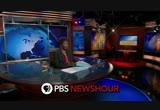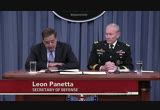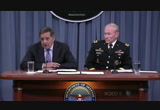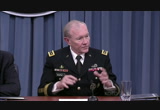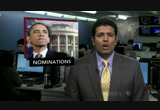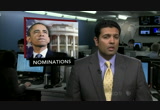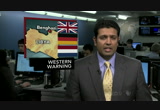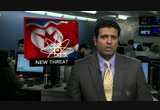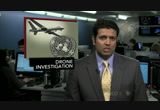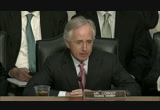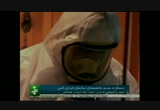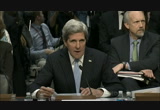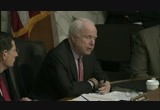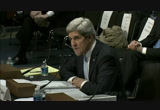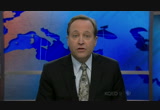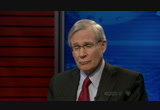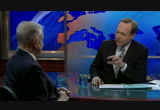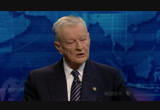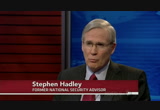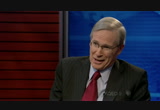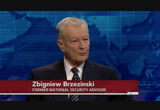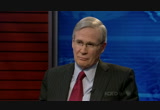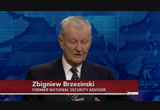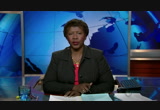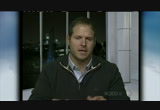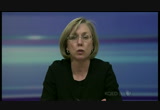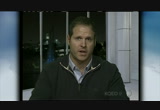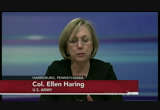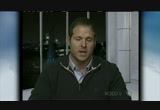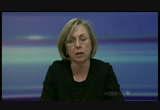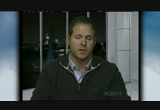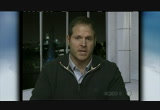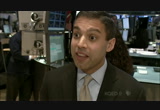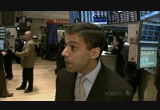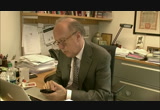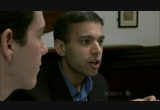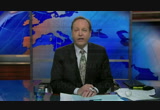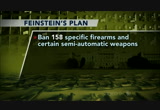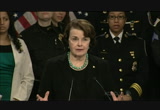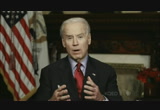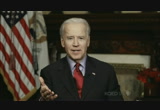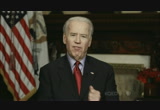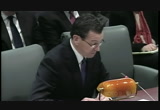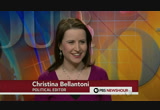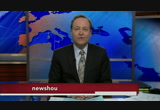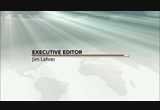tv PBS News Hour PBS January 24, 2013 3:00pm-4:00pm PST
3:00 pm
>> major funding for the pbs newshour has been provided by: >> and by the alfred p. sloan foundation. supporting science, technology, and improved economic performance and financial literacy in the 21st century. >> and with the ongoing support of these institutions and foundations. and... >> this program was made possible by the corporation for public broadcasting.
3:01 pm
and by contributions to your pbs station from viewers like you. thank you. >> brown: the u.s. military has a new order of the day: working up plans for putting women on the front lines. the process was set in motion today at the pentagon. >> not everyone is going to be able to be a combat soldier. but everyone is entitled to a chance. >> brown: with that, defense secretary leon panetta-- joined by the chair of the joint chiefs of staff, general martin dempsey-- announced he's ending a 1994 ban on women in combat roles. >> as secretary, when i've gone to bethesda to visit wounded warriors, when i've gone to arlington to bury our dead, there is no distinction that's made between the sacrifices of
3:02 pm
man and women in uniform. they serve, they're wounded and they die right next to each other. the time has come to recognize that reality. >> brown: nearly 300,000 women have deployed over the past 11 years in iraq and afghanistan, where the frontlines aren't so clearly drawn. and 152 have died there. today's decision opens up some 230,000 battlefront positions to women, many in army and marine infantry units. commanders will have to decide whether women will be eligible for elite forces, such as the navy seals and the army's delta force. >> let me be clear-- we're not talking about reducing the qualifications for the job-- if they can meet the qualifications for the job then they should have right to serve, regardless of creed or color or gender or sexual orientation.
3:03 pm
>> brown: the move drew wide praise from women's groups and others. but one former member of delta force, now with the conservative family research council called the move another social experiment. jerry boykin, said in a statement that commanders will now have the distraction of having to provide some separation of the genders during fast moving and deadly situations. is it worth placing this burden on small unit leaders? i think not. panetta's announcement followed a house hearing yesterday on sexual misconduct in the military. a recent study found that in 2012 alone there were some 800 reported incidents. but general dempsey said ending the ban on women in combat will make a difference. >> when you have one part of the population that is designated as warriors and another that is designated as something else, i think that disparity begins to establish a psychology that in some cases led to that environment.
3:04 pm
i have to believe the more we can treat people equally, the more likely they are to treat each other equally. >> reporter: the decision comes nearly two and a half years after the repeal of another ban "don't ask, don't tell" which barred gays and lesbians from openly serving in the military. >> ifill: for more on how this came together, and what comes >> brown: still to come on the newshour: confirmation hearings for secretary of state nominee john kerry ... china's growth bubble ... and an online "fireside chat" with vice president biden. but first, the other news of the day. here's hari sreenivasan. >> sreenivasan: president obama announced his nominees today to run two key financial regulatory agencies. he tapped mary jo white to chair the securities and exchange commission. she's a former federal prosecutor in new york, with a long record of prosecuting financial fraud and other white- collar crimes. >> if confirmed by the senate, i look forward to committing all of my energies to working with my fellow commissioners and the extremely dedicated and talented men and women of the staff of
3:05 pm
the s.e.c. to fulfill the agency's mission to protect investors, and to ensure the strength, efficiency, and transparency of our capital markets. >> sreenivasan: the president re-nominated richard cordray to lead the consumer financial protection bureau. the former ohio attorney general has held that position for the last year, but his temporary appointment will expire in december. >> we understand that our mission is to stand on the side of consumers: our mothers and fathers, sisters and brothers, sons and daughters and see that they're treated fairly. for more than a year we've been focused on making consumer finance markets work better for the american people. we approach this work with open minds, open ears, and great determination. >> sreenivasan: the president initially used a recess appointment to put cordray in the job, to get around senate republican opposition. senate leaders agreed today on a plan to limit the use of filibusters, at least somewhat. the new limits will reduce how
3:06 pm
many times filibusters may be used, and restrict the time spent debating bills and nominations. some democrats wanted to go much further, saying minority republicans have abused the filibuster. republicans said that's because they're frequently blocked from trying to amend bills. millions of americans from the midwest to new england endured another day of bitter temperatures, as an arctic cold wave refused to let go. hardy skiers in new hampshire braved sub-zero wind chills that extended from upstate new york to northern new england. and several midwestern states had to shovel out from lake- effect snow. some of the most severely affected were on staten island, new york. people who've had no heat since hurricane "sandy" -- last october -- spent the night in tents with propane heaters. britain, the netherlands and germany are warning their citizens to get out of benghazi, libya. the alert today cited an the city. the alert today cited an imminent threat to westerners in the city. there were no specifics, and the u.s. embassy in libya said it had nothing pointing to threats
3:07 pm
against americans. the u.s. ambassador to libya -- and three other americans -- died last september when islamist militants attacked the u.s. consulate in benghazi. north korea declared today it will conduct a third nuclear test, defying newly expanded u.n. sanctions. the announcement came two days after the u.n. security council condemned the north for a long-range rocket test last month. in response, the north's top governing body -- the national defense commission -- issued this statement, on state t.v. >> ( translated ): we do not deny that a variety of satellites and long-range rockets will be launched. one after another and a nuclear test of a higher level which will be carried out by it in the upcoming all-out action, and a new phase of the anti-us struggle that has lasted century after century will target the us, the sworn enemy of the korean people. >> sreenivasan: there was no word on when or where the next rocket launch, or a nuclear test -- would take place. in washington, a white house spokesman said the north korean statement was "needlessly provocative".
3:08 pm
in syria, fighting raged around the outskirts of damascus, as rebels pressed to cut a key road from the capital city to its main airport. government planes and artillery also blasted rebel positions in a suburb to the southwest. it's near a key military air base and government ministries. meanwhile, president bashar al- assad was seen publicly for the first time in two weeks. state t.v. showed him attending a religious ceremony honoring the prophet muhammed's birthday. an american who helped plan the deadly 2008 attacks in mumbai, india has been sentenced to 35 years in federal prison. david headley scouted out the targets for islamist militants from pakistan. the assault killed more than 160 people, including six americans. headley could have gotten life in prison, but federal prosecutors in chicago asked for a more lenient sentence, citing his cooperation. the united nations opened a special investigation today into drone warfare. it will focus on civilian casualties resulting from strikes aimed at suspected terror cells. under president obama, the c.i.a. has stepped up drone attacks, especially in pakistan. britain and israel also use the unmanned aircraft.
3:09 pm
the u.n. report is due in october. in economic news, first-time claims for unemployment benefits hit a five-year low last week. if that trend continues, it could signal a better job market. and on wall street, the dow jones industrial average gained 46 points to close at 13,825. but the nasdaq fell 23 points to close at 3,130. those are some of the day's major stories. now, back to gwen. >> ifill: president obama's nominee for secretary of state - - senator john kerry -- took the first step toward senate confirmation today. newshour congressional correspondent kwame holman reports. >> reporter: for john kerry, it was a day long in coming. the diplomat's son, veteran senator, and former democratic presidential nominee has been considered a potential secretary of state for years. >> you've almost lived your entire life for this moment. >> reporter: indeed, kerry first appeared before the senate foreign relations committee in 1971, as a vietnam veteran challenging senators over the
3:10 pm
war. >> we cannot fight communism all over the world and i think we should have learnt that lesson by now. >> reporter: now, the massachusetts democrat chairs the committee, and he warned today that the u.s. must put its fiscal house in order, to lead in the age of an emerging china and the arab awakening. >> it is urgent that we show people in the rest of the world that we can get our business done in an effective and timely way. every day that goes by where america is uncertain about engaging in that arena or unwilling to put our best foot forward and win, unwilling to demonstrate our resolve to lead is a day in which we weaken our nation itself. >> reporter: as secretary of state, kerry would face the thorny issue of iran and its nuclear program. he said today he is totally committed to enforcing sanctions. >> we must resolve the questions surrounding iran's nuclear program. the president has made it
3:11 pm
definitive; we will do what we must do to prevent iran from obtaining a nuclear weapon. and i repeat here today: our policy is not containment. it is prevention. and the clock is ticking on our efforts to secure responsible compliance. >> reporter: kerry also pointed to the civil war in syria and lamented a missed opportunity. he had met with president bashar al assad back in 2009. >> i remember president assad said to me, "i have 500,000 kids who turn 18 every year, and i don't have a place to put them; i don't have jobs for them; i need to be able to change what's happening here." and, you know, clearly, thinking down the road, you know, he wanted to try to find some way to reach out to the west and see if there was some kind of an accommodation. history caught up to us. that never happened. and it's now moot because he has
3:12 pm
made a set of judgments that are inexcusable, that are reprehensible and, i think, is not long for remaining as the head of state in syria. >> reporter: republican senator john mccain supports the kerry nomination. but he again criticized president obama for not taking stronger action against the assad regime. >> we are sowing the wind in syria, and we're going reap the whirlwind. and that whirlwind will be the increased presence of al-qaida and islamist groups, which are now flooding into syria, as you know. and we can do a lot more without putting american boots on the ground, and we can prevent this further slaughter and massacre and inhumanity. otherwise, we will be judged very, very harshly by history. >> i have complete understanding
3:13 pm
of where you're coming from on this and knowing your frustration and know what you're trying to say about it. what i think everybody worries about, john, is that if you have a complete implosion of the state, nobody has clear definition of how you put those pieces back together, number one. and number two, you have a much greater risk with respect to the chemical weapons. now, that's why i want to get in and see what the contingency plans are because i can't measure risk without having a sense of what's on the table. >> reporter: kerry also fielded pointed questions about another cabinet nominee-- former republican senator chuck hagel-- tapped for secretary of defense. tennessee republican bob corker voiced concern about hagel's support for reducing u.s. nuclear weapons by 80%.
3:14 pm
>> the president has nominated he was part of a group called global zero, and for those of us who care deeply about our nuclear arsenal and modernization and that type of thing, some of the things that were authored in this report candidly are concerning. >> i will say this. i know chuck hagel, and i think he is a strong, patriotic former senator, and he will be a strong secretary of defense. >> reporter: there were no doubts expressed about kerry's own qualifications or his prospects. his confirmation to succeed hillary clinton at state is considered a virtual formality. >> brown: and we look at the kerry nomination and foreign policy challenges he'll face, with two men who've served as national security adviser to the president. zbigniew brzezinski held that position with president carter. he's now a counselor at the center for strategic and international studies. stephen hadley served under
3:15 pm
president george w. bush. he's currently a senior adviser at the united states institute of peace. welcome to both of you. first, zbigniew brzezinski, your thoughts on john kerry as nominee for secretary of state? >> i think he's an absolutely top-notch choice. very good. experienced, solid, energetic with a broad vision and with a strong focus on trying to stabilize those parts of the world that are especially dangerous. i think he's practical, intelligent, well informed. >> brown: stephen hadley? >> he's in a way spent his whole life preparing for this job and it's good he did because he takes in the a very challenging time and i think he's going to have a lot of challenges before him. i think one of them is to prioritize where he's going to put his time. >> brown: well, you know, he spoke about the economy, getting the economy right first and foremost. he said "more than ever foreign policy is economic policy." did that sound right to you? >> i think that's right and i
3:16 pm
think this is a man who's grown up, really, in the political military side of foreign policy and national security and i think one of the challenges will be for him to recognize that the economic instrument in trade is really very important. if you look at asia, the coin of the realm in asia is trade and economics and, you know, if we're going to have a rebalancing toward asia, it needs to be an economics and trade overwhelmingly. so he's got, i think, a real opportunity to help lead the administration in using all of our instruments for national power influence, particularly economic and trade. >> brown: what do you think -- i mean, i know what you think about -- we talked about this in your last book about the need for economic thinking, i guess, changing the way we think about the world. but do you think that the administration has understood that well? >> i think obama understands it. i think obama understands that we're in a new age. if you will, the 20th century
3:17 pm
was a century of struggle for hegemony. and that involved direct political contests, military power. we are now in an age in which struggle for hegemony makes no sense, it's more whether we can establish enough stability in the world that we can deal with global problems. in that context, economic health is the point of departure. it's also the point of departure for global support for the united states and respect for the united states. >> brown: when he brings up climate change though through security, that's what he's talking about? >> exactly. but i do suspect as a practical matter he's going to be more preoccupied with potential strategic challenges. in the middle east, first of all and that involves a whole gambit of issues, in our relations with china, potentialfully our relations with russia and the growing problem of how do we structure an effective alliance with europe. and these the kind of issues that require a lot of patience and intelligence and a good team
3:18 pm
my last point is i think i now see a single team in the area of foreign affairs headed by the president. with his new choice for chief domestic advisor who happens to have been in the n.f.c. for the last four years, then with mr. don len, with mr. kerry, with mr. hagel and mr. brennan, that's a cohesive team. so now we've had two teams, a white house team and the secretary of state's team. this is now a single team. i think it's going to be focused much more on those needed challenges. >> brown: well, the team but also the particular challenges it's facing because we can talk about the domestic economy but trouble spots are there, we report on them every night. >> i think the challenge will be -- i think it is a cohesive team. i think the question is whether more in the second term than the first whether the president and the white house is willing to empower these very capable
3:19 pm
cabinet officials and let them go out and try to solve some of these problems we have and give them political backing back here at home. secondly, i think there is a real prioritization issue. i would agree with zbig. it's really the middle east, asia and the economic instrument. i think he needs to focus on that. and third i think the challenge is also relationships between issues that tend to be stove piped. i'll give you a superficial example. if you think you're going to have a confrontation in iran and you don't want to tank the international economy you need to make sure oil production stays up which requires that oil coming out of iraq to come out of iraq. which means you ought to pay attention to syria because if this struggle in syria goes on it risks destabilizing its neighboring countries, including iraq, which could interrupt the oil flows, which could make it difficult to deal with iran. they need to see the relationship between these
3:20 pm
crises that they're managing and trying to put in place policies that will shape the future, not simply to respond. >> brown: are you saying that suggesting they're not doing the relationships and did you hear that in senator kerry talking about iran? >> i think it's a challenge for any national security advisor. i think zbig would agree with that. it was a challenge in the baigs. i always think it is a challenge because these things tend to come at you as individual challenges and individual crises and stepping back, seeing the relationships and having policies that reflect those relationships is one of the real challenges. >> brown: what did you hear particularly today on iran and syria? >> nothing especially new except recognition of the fact that these are terribly complex problems which cannot be resolved quickly nor by the use of force alone. and there was a news item tonight which you had here earlier which is very significant: korea. you had an item on how
3:21 pm
threatening it has become. but not much has been said about the fact that just yesterday a resolution of the u.n. security council critical of north korea with the support of china and russia passed. that's unprecedented. we have to think of the same kind of an approach to syria. if we can get the russians and chinese in we're much more likely to come out without the region exploding. the same is true in the longer run of iran. so these are the kind of things which are innernt the complexity of the new age we're in. it's not an age in which you struggle and break through with force. you have to manage a lot of resources and a lot of priorities. >> brown: let me ask you both in our last couple minutes here, i'm thinking about the inauguration speech a few days ago. not a lot of talk about foreign policy. there has been talk about rebalancing after two long wars, focusing on rebuilding the united states. is there, stephen hadley
3:22 pm
starting with you -- i don't know, do you fear that we might pull back from the-- disengage too much? >> i think we already have. i think you see hit in the middle east. there's a phrase "a decade of war is coming to an end." if you look at what's happening in the middle east it's not true. what's coming to an end is our involvement from a military standpoint in the middle east. if we're not going to be involved militarily in the middle east we still have interest there. and so the challenge is how are we going to protect those interests and advance those interests in a different way. i think that's one of the real challenges for this next team. >> brown: what do you think? >> i would agree, i would agree with what steve said. in terms of the middle east, however, i would say this. we'll have one more chance. i believe that. one more chance to make an effort to break through between the israelis and the palestinians but if we can only do it if we're engaged and we have all of the major parties in the world engaged in our side and then if there is an agreement perhaps detach this
3:23 pm
signing of the agreement, the conclusion of the agreement from its implementation that by gaining times for the parties and both sides-- palestinians and israelis-- to deal with their own internal dissidents. >> brown: it doesn't otherwise feel like there's another chance but you think there is? >> well, if there isn't then it's the end of the road for peace and the prospects both for the israelis and the palestinians are extremely grim. >> brown: all right, well, that's a bad note to end on, i guess, but we'll look for the next four years. zbigniew brzezinski, stephen hadley, thank you both very much. >> ifill: and we return to the decision to lift the ban on women in the military. for more on how this came together, and what comes next, we turn to colonel ellen haring, who was in the army nearly 30 years when she filed suit against the defense department after being denied the opportunity to deploy to
3:24 pm
afghanistan. and wade zirkle-- he served two tours in iraq as an infantry officer in the marine corps, and earned a purple heart. i guess i'll ask both of you starting with you colonel haring, what is good and what is bad about this change? >> well, i think pretty everything is good about the change. it opens a vast number of opportunities to women across the military. but i think this is a win for not only women but also our military and really the country broadly. >> ifill: i'd ask wade zirkle the same question. >> sure, gwen. i think this is generally good. i think your viewers need to understand that this is is merely the lifting of a ban and the service chiefs need to decide how it's going to be implemented. so there still will be some occupational specialties that will be restricted from women. so i think generally it's good.
3:25 pm
it's good for women, it's good for the military, it's good for our country. although there are a lot of questions as to how they'll be implemented. >> ifill: let's walk through these starting with you kohl they will haring. today at the pentagon when secretary panetta and general democracy were asked about this reporters said that they noted both of them mentioned a unnecessary gender barriers would be removed and the reporter asked "what are the necessary gender barriers?" so let me ask you that? >> i don't see any necessary gender barriers. and i'm not sure what that was in reference to. >> ifill: well, there are questions that have been raised about women's ability to perform in combat situations and you say there are no barriers to that? >> well, if we establish one standard for all there is no barrier. it's whoever can meet that standard. and i'm assuming you're talking about physical standards. >> ifill: yes, that's the question that's been raised.
3:26 pm
>> yes, right. and i've heard the secretary say that -- go ahead. >> ifill: finish, colonel haring and then i'm come to you mr. zirkle. >> what i heard the secretary say is we're going to establish one physical standard, men or women regardless, whoever meets that physical standard can be in those occupational specialties. >> ifill: wade zirkle? >> sure, first i think it's important to look at what the combat arms are. combat arms generally are in three categories, you have artillery, you have armor and you have infantry. i think with artillery and armor i think women can very ably serve physically. in the infantry, especially light infantry i think there are real questions about the physical strength and the way women and men are built, the physical strength of whether women can carry out those rolls. one very common drill we did in
3:27 pm
the infantry was called the fireman's carry which means you walk up to a marine that's lying on the ground and he's pro tending to play dead and completely limp and you need to hoist that marine up on your shoulders and then lift him up and carry him for over 100 yards and i'm 2525 pounds and there are marines a lot bigger than i am and i think that's a -- the way women are built that's a very -- one of several tests that are very, very difficult to do and are very relevant tests for what happened in combat. >> ifill: ellen haring, do you want to respond to that? >> well, i would be surprised to see that every infantryman could carry a 220 pound man. but it goes back to the within standard. if a man or a woman can meet that standard, if the standard is a 220 pound man than every man-- just like every woman-- should meet that standard.
3:28 pm
i'm not sure that that's an existing standard. i keep hearing that as this is the measure of our fitness but i suspect there are many men in the infantry that could not hoist a 220 pound man and carry him a hundred yards so i don't know that that's been a standard -- >> well, ma'am, i invite you to come to infantry training and see it. i mean, it happens. i would also say, just to remove that test and talk about real operational constraints, an infantryman's gear head to toe is about 90 pounds, that's not including his pack which is about 50 additional pounds and that's not even including if he's part of a weapons unit or mortar unit which is even more weight. we're talking over 150 pounds that you might have to hump for dozens of miles over mountains over courses of days. these brutal physical constraints that are put on
3:29 pm
anybody but women and men are built differently. >> ifill: let me step back for a moment based on today's announcement some version of this is going to happen. i want to ask ellen haring about this. does the way we practice war, has it changed to who the warriors can be? that is, this idea of front lines and combat do they still exist in the same way when this was first considered to be a wise way to decide who does what job? >> well, i think that's one of the reasons that the combat exclusion policy is being lifted today so designated some areas as safe and other areas as unsafe is not the reality of what we've seen in the past ten years. so women have found themselves living, fighting, and dying with their male counterparts. so i think we're adjusting to meet the realities that we see
3:30 pm
today. >> ifill: wayne zirkle, a member of congress, tammy duckworth, who lost two legs in combat, she said "you look at my legs, i didn't lose them going door to door." so she was trying to make the point that we've already passed that point. in fact, that's another point general dempsey made today, that the idea of women in combat is a real that's been settled. is that something you disagree with? >> well, i think going back to the colonel's last point, what we've seen is a counterinsurgency where there are no "frontline"s. what we've seen the last ten years is not necessarily what we're going to see in the next 50 years. if and when we fight the north koreans or the chinese or any number of adversaries there will be wars where we have front lines that have rear echelon and the question is do we want women serving in those very front light infantry roles? and if so, just an example here,
3:31 pm
when a man joins the marine corps, the marine corps sends him to be a cook or separator or supply clerk or infantryman. it's not always that young marine's decision. does that mean a woman that joins the army will be made to serve in the infantry whether she wants to or not? >> ifill: i do want to ask colonel haring that question which is this idea of if a woman chooses not to be part of the infantry, doesn't want to be at the tip of the spear, does this make it impossible for her not to do that? >> no, absolutely not. we have a volunteer military and you volunteer for these specialties that you're interested in. so a woman would volunteer for the infantry or they'd volunteer for whatever specialty they're interested in. >> that's not -- >> ifill: let her finish. >> but you don't always get what you want. a lot of times you're sent to a specialty you didn't want. >> ifill: pardon me, mr. zirkle, we don't have a lot of time. please let ms. haring finish.
3:32 pm
go ahead, colonel. >> actually i think i was finished. >> ifill: okay. >> we volunteer for the positions that we eventually serve in. now, that's true that you can't induct by volunteer to be a linguist. i could end up -- in fact, i talked to a woman today who was an arab linguist, she actually accompanied the invasion force into iraq, her skills, which was her arab language skills, were vitally important to the infantry she served with there in iraq and of course she did not anticipate being embedded but she was very proud of that service and she's now a strong advocate for the repeal of this ban. >> ifill: wade zirkle, a final word. >> i would just ask this question: would the colonel support women being part of the draft and if so would she support any able-bodied able aged woman being sent to the front lines by law in a compulsory manner to serve as a infantry woman? >> ifill: you have a few seconds
3:33 pm
to answer? >> i don't know how this is going to effect the selective service but i do think that with full rights comes full responsibilities. >> ifill: colonel ellen haring and wade zirkle founder of vets for freedom, thank you very much. >> brown: next, trying to make sense of china's economy. a top chinese official told leaders at the davos world economic forum in switzerland this week the country is expecting faster growth this year. if anything, he said, china's trying to stop the economy from overheating too quickly. but some are asking whether china's high-flying growth may be built on questionable assumptions. "newshour" economics correspondent paul solman has our look as, yes, part of his ongoing reporting: "making sense of financial news." >> reporter: china: the juggernaut that's driving a world economic recovery? or a classic bubble about to burst, taking us all down with
3:34 pm
it? the evidence is dramatic, on both sides. on the one hand, breakneck urbanization-- building ten new york sized cities by 2025. on the other hand, ghost towns, empty housing developments. recent headlines report that chinese exports are back on track. but, they also feature corruption, the riches of the politically plugged-in, stunning inequality. yes, wages are rising; a middle class, burgeoning wealth everywhere apparent. but, mounting protests against unlivable wages and working conditions.
3:35 pm
in our 2005 china on the rise series we documented a shanghai tower taller than the empire state building. but, last year, china's broad group, erected a 30-story energy-efficient hotel in 15 days and now intends to put up j220, a 220-story tower more than half a mile high, ten feet taller than dubai's burj khalifa. while the burj took tom cruise just moments to scale, it took five years to build. j220 is slated to rise, toe to tip, in 90 days. sure evidence of a china
3:36 pm
>> the world's tallest tower was in kuala lumpur, not far from >> reporter: well, this expert wouldn't. to former investment banker and hedge fund operative vikram mansharamani, author of a book on financial bubbles called boombustology, the edifice complex is a sign of a market top from which the only direction is down. >> in 1997 the world's tallest tower was in kuala lumpur, not far from the base of the asian financial crisis. in 1999 the worlds tallest tower status moved to taipei, the home of the tech boom, at least in a hardware sense and finally, by 2007 the worlds tallest tower status moved from asia to the middle east where the burj dubai within weeks of global equity markets peaking. >> reporter: and going further back, this building, 40 wall street, was being topped off as the world's tallest in 1929, when just blocks away, the new york stock exchange crashed. mansharamani took us to the exchange floor for another sign of a china bubble: the stock
3:37 pm
price of art auctioneer sothebys, which, he has found, also tends to peak just before a bubble pops. >> in 1989, when sothebys stock hit a new high, it was world record art prices paid by japanese buyers that set that stock on fire. >> reporter: two months later, japans nikkei index hit its peak: nearly 40,000. today, it slouches at around 10,000. as for sothebys... >> in 1999, the stock again hit a new high, this time the buying pressure was coming from those who had generated wealth through the technology, media and telecom sector. >> reporter: wealth that popped when the tech bubble burst in 2000. >> stock hit a new high in may of 2007, this time world record art prices being set by buyers from emerging markets, hedge fund billionaires, private equity billionaires, beneficiaries of easy money.
3:38 pm
>> reporter: the great recession hit six months later. sothebys sank, but it's up again, thanks to a new group of buyers. the chinese are now driving the art market. and yet... >> we see empty malls, empty ghost cities, excess real estate, millions, and millions of units empty. >> reporter: well, yes. but what about the explosion in g.d.p. >> so in china we have examples of g.d.p. creation that does not generate economic activity of value. >> reporter: like what? >> so we've got an example of a seven-year-old bridge with a 40 year use of life blown up and rebuilt. why? because you generate g.d.p. credit for the explosives that you purchased, the construction crew that comes in to clean up and the construction crew that builds the new bridge, the new
3:39 pm
steel, the new cement. >> reporter: mansharamani now teaches his brand of bubble-ology at yale. do his students buy his china story? >> there is a bubble so that's >> reporter: consider the coming catastrophe of the one-child policy. >> the social security programs and how the government is sort of going to fund this aging population. >> reporter: of course, not everyone at yale believes that china's headed for a fall. >> if you're looking for a crash landing in china, a slowdown that really puts the economy and its supply chain through the windshield. it's not going to happen. >> reporter: steven roach, longtime economist for the morgan stanley investment bank, spent ten years in china. he teaches several courses on the chinese economy at yale. >> look, china is a high growth and the fast pace focused on exports and investment deliver beyond anyone's wildest
3:40 pm
expectations including the chinese. >> reporter: but a slowdown doesn't sound the death knell for growth, says roach, just a very deliberate shifting of the gears. look at the latest five-year plan, enacted in 2011. >> it's redirecting the mix of economic growth away from investment and exports towards more of a consumer-led model. they don't have the services based infrastructure that you need for a modern balanced thriving consumer culture. their industries such as wholesale trade, retail trade, domestic transportation, supply chain logistics, even leisure and hospitality are tiny compared to what the footprint should be in an economy the size and scale of china. >> reporter: what about the ghost towns that you see in china now? >> basically a myth. when you have urban populations expanding at the rate they are in china with rural urban migration averaging 15 to 20 million people a year since 1990 you have to build in anticipation of the influx.
3:41 pm
it's the field of dreams approach and if you just wait until the workers move there you'll have an urban underclass teaming with social unrest. >> reporter: because, they'll have no place to live? >> exactly. >> reporter: what if you build it, the workers come, but consumer-led growth doesn't materialize quickly enough? >> have we built an extra three years of demand for properties in shanghai such that for the following three years we won't have any needed new construction? what if we get to ten years of excess years of capacity? if the economy doesn't continue to grow and you need to continue to build excess capacity to keep the economy growing. well now, we've got a bigger problem on our hands. >> reporter: in fact, it all reminds mansharamani of the last great asian bubble: japan. that's our stretch of a segue to the tables down at morys and a
3:42 pm
whiff of the whiffenpoofs, yales famed a capella singing group. the professor had invited us to dinner with three of his former students. jared middleman and zachary graham buy into the china bubble hypothesis. rhodes scholar-designate cate laporte-oshiro does not. >> i think that while they have a lot of pressure stacked against them, declining labor force, overinvestment, corruptions, scandals, at the same time they've done fairly well dealing with a lot of different problems at one time. >> i thought we learned through the example of the soviet union that central planning is good at mobilizing resources but is not good at sustaining innovation, not good at sustaining incentives for real long term growth. >> reporter: and yet, given all the trillions the country has amassed over the past few
3:43 pm
decades, it may have a soft landing, while it's the rest of the world that will suffer. >> suppliers to the things that are going into the building of stuff, whether they be in the form of cement, or steel, or zinc, whether its coming from australia, south africa, or that whole system that has been feeding this investment beast will be found to have massive overcapacity. >> so if they succeed and avoid a bubble bursting and reorient their economy from export led investment driven growth into sort of outgrowing middle class consumer economy, then they can be totally fine and the rest of the world can still suffer. >> as weird as that sounds, i actually think the pain will be felt outside. >> reporter: china sneezes and the rest of the world catches a cold. not a pleasant prospect, especially this flu-ridden winter. >> brown: finally tonight, lawmakers in washington and in some states are making swift moves on gun control measures and vice president biden is finding some new routes to talk up the issue. hari is back with our look.
3:44 pm
>> sreenivasan: just eight days after president obama unveiled a sweeping proposal to address gun violence, senate democrats put forward a plan of their own that would renew a ban on assault weapons. the measure was introduced by california democrat dianne feinstein, who led the effort to pass the first ban in 1994. that legislation expired a decade later, and feinstein said it was past time to take action. >> we have done our best to craft a responsible bill to ban these assault weapons. guns that are designed for military use bought all over this country and often used for mass murder. >> sreenivasan: feinstein's proposal would ban the sale, transportation, importation or manufacturing of more than 150 specifically named firearms as well as certain semi-automatic rifles, handguns and shotguns; limit ammunition magazines to ten rounds; grandfather weapons legally owned on the date of
3:45 pm
enactment and, exempt over 900 weapons used for hunting or sporting activity. in response, the national rifle association released a statement that said, "the american people know gun bans do not work and we are confident congress will reject senator feinstein's wrong-headed approach." the effort faces long odds in the republican-controlled house, and in the senate, where some democrats do not support expanded gun control. feinstein acknowledged it would be a tough sell despite 20 children and six adults being killed in the december mass shooting at a school in newtown, connecticut. >> this is really an uphill road. if anyone asked today, "can you win this?" the answer is, we don't know. it's so uphill. >> sreenivasan: vice president biden, who led the obama administration's task force examining gun violence, spent weeks meeting with more than 200 stakeholders after the newtown shootings. >> mr. vice president, welcome
3:46 pm
to google plus. >> sreenivasan: this afternoon, the vice president joined me and four others from across the country in a conversation on gun policy in a google hangout. assault weapons were at the top of the discussion. >> one of reason why the assault weapons ban makes sense even though it accounts for a small percentage of the murders or those who die as the consequence of a weapon every year is because police organizations overwhelmingly support it because they get outgunned. they are outgunned on the street by the bad guys and the proliferation of these weapons. when in fact there were fewer police being murdered, fewer being outgunned when the assault weapons ban was in existence. >> sreenivasan: there have been several people online are asking about the fact that you are a gun owner, you own two shotguns. what's your interpretation of the second amendment?
3:47 pm
>> my interpretation is it is an individual right. individual right to own a weapon both for recreation for hunting and also for your self protection. you have an individual right to do that. but just as you don't have an individual right to buy an f-15 if you're a billionaire with ordinance on it, just like you don't have the right to buy an m1 tank, just like you don't have the right to buy an automatic weapon, those judgements have been made that there are no societal, reasonable societal justification or constitutional justification for owning them. >> sreenivasan: and phil defranco, who hosts a popular online show with millions of viewers, pressed the vice president over the administration's proposal to limit the number of rounds in a magazine. >> the gunman in connecticut fire 150 rounds, meaning that he had to swap out his 30 round magazines four times. with how fast you can swap out a magazine do you think limiting
3:48 pm
magazine size to ten will have impact? >> well, let's assume and by the way, your facts are correct about 30. he had some 30 shells. he had to swap out four or five times. if it was ten shells in there he would have had to swap out 30 times, or he would have had to swap out 25 times. and so what would happen is the response time in fact may have saved one kid's life. maybe one more kid would be alive. let me give you an example. in the case of gabby gifford when the guy had to swap out a new magazine he fumbled and he was able and an older woman reached up and grabbed his hand. all of them would've been dead had he not had to change that magazine, had there been 30 or
3:49 pm
40 clips. same way with aurora. a guy had 100 shells in the magazine. fortunately it jammed. it jammed enough that it gave time for folks to get there and in fact save lives. >> sreenivasan: back in connecticut this morning, the first meeting of the sandy hook advisory commission took place. connecticut's democratic governor, dannel malloy, has tasked the panel with making recommendations on school safety, mental health and gun violence prevention. >> we need to develop a common sense way to regulate access to guns. we need to make sure that our mental health professionals have access to resources and information they need to get treatment to those who need it. we must make sure the public has better information about what to do when they suspect someone might be battling mental illness. >> sreenivasan: still, most of the focus is likely to remain at the national level in the coming weeks, with the president expected to address the issue of gun violence in his state of the union address on february 12.
3:50 pm
so, where does the fight stand in congress? and how does the administration plan to move its agenda forward? joining me now is "newshour" political editor christina bellantoni. so if this is such an uphill climb, why do this now? if it's motivating the opposition's base, it's fueling the n.r.a. with new funding, new membership, why do the democrats want to take this on? >> well, in part because they do want to actually see action, but what you saw with senator feinstein acknowledging what an uphill battle it is, you start to wonder, the administration's own push with some executive action, with a lot of things that they can do behind the scenes, they're doing this two-fold and congress is acting outside of what the administration wishes. so it's two real tracks and it's no accident the vice president is going to virginia tomorrow to take this show on the road a little bit with a round table discussion, he's going to have different lawmakers there. this is the site -- the state where virginia tech happened, the school shooting there, very tragic, and he's trying to sort
3:51 pm
of capitalize on a lot of that energy the same way they're doing on newtown to motivate people to action. from a political perspective in congress democrats raised pacs, as well. gabrielle giffords aims to raise $20 million for the 2014 midterm elections. the n.r.a. is obviously, as you mentioned, going to be adding to their membership, getting more fund raising so this is a battle and a place where they can take out intense positions. >> sreenivasan: how about putting this in terms of perspective in terms of 2014, 2016? even the vice president why he decided to come out on good deal but is on almost a road tour. he seems to be campaigning for both gun rights and gun control or sun safety as well as maybe for himself. >> well, the presidential race, of course, we just inaugurated president obama for his second term. we've seen action shifts to the states. you have democratic governors making moves on this.
3:52 pm
andrew cuomo in new york is taking the lead. he could run for president. the vice president is not making it secret that he could be running for president as well so he's the front man on this major issue that the president will be talking about. so none of this is without politics in mind. the money does matter, the momentum on this matters when you're talking to different families affected by it. that's an issue they want to use for political gain. >> brown:. >> sreenivasan: what about the other measures? this is just the assault weapons ban but there seems to be more consensus on background checks. why not take that strategic approach and get as much as you can passed as soon as you can? i >> the white house says that's what they're trying to do. they want to work in tandem with republicans who are pushing mental health funding who can look at that issue but even the n.r.a. did a survey of its ownmens and they're saying we don't support universal background checks or this registration nationally. >> sreenivasan: christina bellantoni, our politics ed tord thank you so much. on our home page you can watch
3:53 pm
the entire hangout and contribute to the conversation by adding your comments. >> ifill: again, the major developments of the day: defense secretary leon panetta formally announced an end to the ban on women serving in combat, and he said it will make the u.s. military stronger. senator john kerry sailed through his confirmation hearing to be secretary of state. and north korea announced it will conduct another nuclear test, in defiance of newly expanded u.n. sanctions. >> brown: online the first of ray suarez's dispatches from the annual world economic forum. ray is in switzerland along with 44 heads of state, business leaders, cultural figures and others. his column-- "davos, day one"-- is about the panel he moderated on doing business in africa. and we have the second installment in our series on "comedy and economics". that's on the making sense page. all that and more is on our website newshour.pbs.org. >> ifill: and that's the "newshour" for tonight. i'm gwen ifill. >> brown: and i'm jeffrey brown. we'll see you online and again here tomorrow evening. with mark shields and david brooks among others. thank you and good night.
3:54 pm
>> major funding for the pbs newshour has been provided by: >> and the william and flora hewlett foundation, working to solve social and environmental problems at home and around the world. >> and with the ongoing support of these institutions and foundations. and... >> this program was made possible by the corporation for public broadcasting. and by contributions to your pbs station from viewers like you. thank you. captioning sponsored by macneil/lehrer productions captioned by media access group at wgbh access.wgbh.org
3:58 pm
>> this is "bbc world news america." funding for this presentation is made possible by the freeman foundation of new york, stowe, vermont, and honolulu, newman's own foundation, and union bank. >> at union bank, our relationship managers work hard to know your business, offering specialized solutions and capital to help you meet your growth objectives. we offer expertise and tailored solutions for small businesses and major corporations. what can we do for you? >> and now, "bbc world news america." >> this is "bbc world news
3:59 pm
america." for the first time, the pentagon allows american women to serve in combat roles. britain, germany, and the netherlands are to their citizens to get out of benghazi, libya in response to an imminent threat against westerners. >> just touched a button. it hands you the picture. >> it brought us a new age of instant photography. tonight, we focus on the man whose polaroids help capture our lives in real time. welcome to our viewers on public television in america and around the globe. it is time for policy to catch up with reality. that was the message that leon panea
184 Views
IN COLLECTIONS
KQED (PBS) Television Archive
Television Archive  Television Archive News Search Service
Television Archive News Search Service 
Uploaded by TV Archive on

 Live Music Archive
Live Music Archive Librivox Free Audio
Librivox Free Audio Metropolitan Museum
Metropolitan Museum Cleveland Museum of Art
Cleveland Museum of Art Internet Arcade
Internet Arcade Console Living Room
Console Living Room Books to Borrow
Books to Borrow Open Library
Open Library TV News
TV News Understanding 9/11
Understanding 9/11